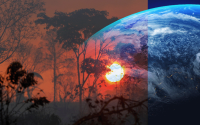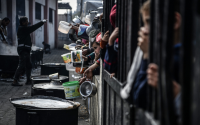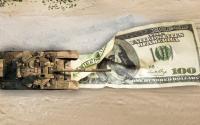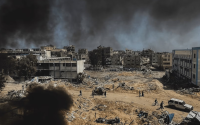January 31 2011
Over the shelves of lettuce and broccoli (product of Israel), and the honey, eggs, parsley and coriander (product of Palestine), the demonstrators on television are no longer the same. The TV set in the vegetable shop in Ramallah is situated opposite the cashier, and the live broadcasts from the streets of Tunis two weeks ago, and from Egypt and Jordan this past week, drew more ratings than the soap operas and religious sermons customers often see playing there.
"Did you catch what the protester [in Tunis, on Al Jazeera] just said?" asked A., a shop employee. "He said the Palestinians' situation is better than that of the Tunisians, that they [the Palestinians] have food."
I told him this was the same impression members of Egyptian solidarity delegations had upon visiting the Gaza Strip after Operation Cast Lead. They were amazed at the abundance of food, especially fruits and vegetables, they were able to find in Gaza. And I heard that not from the Israeli Civil Administration spokesmen, but from Egyptians and Palestinians.
The most well-oiled aid apparatus in the world ensures that an uprising will not be triggered by a lack of food in Gaza and the West Bank - even when it comes to the poorest of families. But is that really why feelings of solidarity with their brethren in Arab countries are not expressed in the Palestinian streets?
"The Tunisians have restored the honor of the Arab Nation," said a 35-year-old woman born in Nablus, her eyes shining. That was two weeks ago. Two days ago, a young woman from Tul Karm, whose eyes also shone as she watched demonstrations unfold on TV, said: "We are all waiting for [Egyptian President Hosni] Mubarak to fall."
In Gaza, a 4-year-old girl repeats the protesters' chants - "We want a change of regime!" - to the great enjoyment of her parents, who listen intently to the radio broadcasts since, as usual, there is no electricity there.
Advanced technology has created the intimacy of one large village where everyone knows everyone else. E., a Palestinian Jerusalemite, enthusiastically shows around the photo he's just received on his mobile telephone from a friend in Egypt, in which Egyptian policemen can be seen fleeing as demonstrators give them chase. E. arrived at the joint Israeli-Palestinian demonstration in Sheikh Jarrah (against the expulsion of Palestinian residents from that East Jerusalem neighborhood ) straight from another protest at the Old City's Damascus Gate, where several dozen participants greeted those leaving the Friday prayers (at Al-Aqsa Mosque ) with banners supporting the Tunisian and Egyptian uprisings.
E. heard that members of Hamas and the Hizb Al-Tahrir Islamic Liberation Party had gathered in the plaza outside the Al-Aqsa Mosque to demonstrate against the Israeli excavations in the area, as well as the Palestinian Authority. But he was not there personally to confirm this, as the Israeli police does not permit men of his age to pray in the mosque.
Thwarted in Ramallah
In any event, what was apparently possible in Jerusalem was thwarted in Ramallah. On Thursday, January 20, a group of young people wanted to demonstrate their support for the Tunisians. As is customary nowadays, they organized themselves using Facebook and e-mail. And in accordance with Palestinian law, they informed the police 48 hours in advance of their intention to gather in Manara Square - only to learn that public demonstrations in support of the Tunisian people had been forbidden.
Some of the young people arrived at the square anyway, at the scheduled time. They were surprised to find that, completely by chance, another demonstration was taking place there at that time - to express solidarity with and concern for Haytham Salhiyeh, a prisoner in an Israeli jail against whom, prisoner organizations claim, an attempted poisoning took place.
The people who had shown up to support the revolt in Tunisia decided to join the other demonstration. But because one of them was still carrying a Tunisian flag, policemen rushed over and dispersed the crowd. It is superfluous to add that, a few days later, protests against Al Jazeera - which had leaked the so-called Palestine Papers - were held without disturbance.
Immediately after Tunisian President Zine El Abidine Ben Ali fled his country, Palestinian websites published a declaration from the PLO's executive committee, expressing solidarity with the courageous Tunisian people struggling against oppression and corruption. Hours later, senior PLO official Ahmed Abdel Rahman clarified that the executive committee had not convened and therefore could not have released any official statement. Perhaps the scenes of angry Tunisians attacking their leaders' homes were too reminiscent of the scenes in Gaza in 2007, when an angry crowd looted the luxurious and somewhat pretentious homes of PA officials there.
Can one therefore conclude that the Hamas authorities in Gaza are allowing solidarity demonstrations to be staged (just as they permitted protests against the PA last week following Al Jazeera's publication of the Palestine Papers )? On Saturday, a young woman went to the Gaza police where she, too, relying on the same law mentioned above, announced the intention of a group of youths to demonstrate support for the current uprisings in Arab countries. Forget it, they told her. In case anyone thought differently, Hamas is also afraid of the subversive potential and the messages of emancipation.
Both in Gaza and the West Bank, the Palestinian authorities have already proven their excellent ability to suppress demonstrations. Is this what is preventing Palestinians from expressing solidarity with their Arab brethren, who for years were inspired by the scenes of the Palestinian intifada?
The fear that the protests will be suppressed is not the central reason, said a friend who is older than the young people who sought to demonstrate in Ramallah and Gaza.
"We instigated two intifadas and look what came of them - the situation only got worse," he told me. "The first brought us the Palestinian Authority and then the expansion of the settlements; the second - destruction, Israeli repression that is worse than before, and the Hamas regime. People are depressed. They don't see any point in protests. The hope that the dictatorship of occupation would fall if we took to the streets - like in Tunisia and Egypt - has evaporated."






